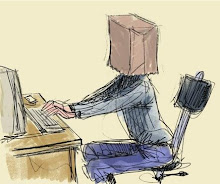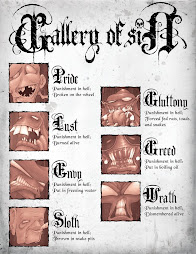Break time is over everyone, let's begin our class shall we?
Give me my fucking life back! Oh sorry, I got carried away for a second there. What was that all about? I'm pretty sure you'll get the gist of it once you see the picture below.
It's an old news anyway but there you have it.
So now it is time for a little Pop Quiz: Did you
like/hate what you just saw?
My answer is final and clearly delivered there.
*inhale*
Why were they banned for fuck sake?
Violating the Copyright Act my ass! If that's your so-called reason why, those popular
Peer to Peer (P2P) programs should get banned as well. That kind of programs are much more popular and easier to use these days. The more the seeders are for a file, the faster you'll get your stuff done. It's the fucking source for everything.
EVERYTHING! But the one got banned in the end were direct downloading sites, don't you think it's pathetic?
How about if we come out with an example? Lets say I want to download a PC game. In order to do so, I have to finish downloading certain split files of the game first. The number of these files usually depends on how big the installer itself, lets say...10gb and there are like 10-11 files that I have to download before I could properly extract them. Oh by the way, you won't get this kind of split files from the P2P programs. I'm not a premium user so I have to bear downloading one file at a time, and lets not forget about those annoying waiting time for each download as well. And here lies the biggest problem of all time, my fucked up connection speed. Randomly said that I need at least two hours to get a download done, there are still 9-10 parts of them. Meaning, I would probably spend like 20-22 hours downloading for
ONE fucking game. That is one sick joke I tell you.
So now that we are done with the example, let us get back to the main issue. How can you be so sure that the unauthorized use of copyright work is destroying the industry? Are you kidding me? To hell with that shit. People would still go to the cinema when there's a new movie coming out. And why is that? Because they know it takes awhile for them to get the clearer copy of the pirated one itself. Put movie aside, what about anime then? They're surely not be showing in the local cinema. And the one we got in the local TV's channel sounds retarded with those fugly dubbed. Have you any idea how many of those anime out there? Not a single clue aren't you? Beats me, I couldn't give out the exact number as well. Since those sharing sites already banned now, my only option left now is to buy them somewhere...not the pirated but the original. And what about those doujin stuffs that you could only get your hands on during the
Comiket?
Whoa hold on, what on earth is Comiket?
Oh well, below are what you should know about Comiket:
- Comiket (コミケット Komiketto), otherwise known as the Comic Market (コミックマーケット Komikku Māketto), is the world's largest self-published comic book fair, held
TWICE a year in Tokyo, Japan.
- It is a grassroots, DIY effort for selling dojinshi, self-published Japanese works.
- As item sold in Comiket are considered very
RARE (because dojinshi are seldom reprinted), some items sold at Comiket can be found in shops or on the Internet at prices up to 10
TIMES the item's original price.
- As for attendance, there were 560,000 people during the summer of 2009(?!).
So there you have it.
As you can see above, the price could goes up to 10 times for its rarity! 10 times?! No shit? You think everyone's here were born rich or something? Get real, this isn't a fucking fairy tale.
Updates:
(a). Problem solved; since those sites were only banned in my country, all I had to do was simply changed the DNS for my ISP.
Voila!
(b).
Let me make this simple; We're fucked.
Megaupload had been shut down, owners been arrested and sentenced. Other cyber locker sites are panicking and closing their services.
How did things ended up this way?
It all started with these two pieces of legislation; SOPA (Stop Online Piracy Act) and PIPA (Protect IP Act). Both are essentially the "same wolf in sheep's clothing".
What powers do these two have?
1. Grant the Justice Department the ability to shut down almost ANY blog or website at will.
2. To make it harder for sites; especially those located outside of the United States, to sell or distribute pirated copyrighted material such as movies and musics.
Worst to come; ACTA (Anti-Counterfeiting Trade Agreement); a proposed international treaty that has been around since 2006 and is still being discussed behind closed doors by unelected officials.
But for what purpose?
To establish an international legal framework for targeting counterfeit goods, generic medicines and copyright infringement on the Internet.
1st of October 2011- Australia, Canada, Japan, Morocco, New Zealand, Singapore, South Korea and the United States were the first countries to sign the treaty. Last month, 22 members of the European Union (EU), including the United Kingdom signed as well, bringing the total number of signatories to 31.
On a side note- Activist hacker group,
Anonymous has reportedly taken down the websites of the
US Department of Justice,
Universal Music, the
RIAA (Recording Industry Association of America), and the
MPAA (Motion Picture Association of America) in retaliation for the Megaupload shutdown and arrests. According to them, that was "the largest on scale attack ever, 10 sites in 20 minutes".
Awesome, a cyberwar. Sweet! *grabs a popcorn*
So, what's next?
(c).
Earlier, I mentioned things about the so-called Peer to Peer (P2P) thingy right? Behold, above is the logo from a well known torrent site;
The Pirate Bay.
At first, I was raging, mad and I was mostly like "
Oh hey, why the hell is this fucking site remain untouched?" all the time. That was until I finally discovered the truth.
But what exactly are they?
The studios and labels (
Sony,
BMG,
Warner, whatever you named them) have a much more difficult time with websites such as Piratebay or, what the studios would call them "
Rogue". It requires a little more knowledge about the details of technology that drives such websites to understand why there are such a complicated issue. They (Piratebay) doesn't actually host any infringing content at all, but has millions of links to content being hosted by peer or nods.
A peer, or node is a personal computer connected to the Internet with an open source application based on
BitTorrent open source code. BitTorrent allows people to host a file (movie, music, software etc). Those files are made available to download using a torrent download application which happens to be the same application that host the infringing files. When someone download a file using BitTorrent, they are actually receiving that one file from multiple machines that were located in multiple countries and it is possible that the person hosting the infringing file might not even know they are hosting it. Confusing, isn't it? Thus, it makes things more difficult and dangerous.
Dangerous because, Piratebay doesn't actually host, deliver or infringe on any copyright at all. They only have link to such content, because it shows up in the search engine in the same way search result that appears in Google. However, under SOPA and PIPA those sites can not only be prosecuted but shut down entirely for the behavior of others they cannot control.
Interesting?
If you wish to learn more about these, open up your browser- Google.
Sadly, it is now time to end today's class. But before that, I would like to share this wonderful, well-written thought by a person named Xeddy.
"
All the fools that tried to make money instead of sharing the love of sharing messed everything up for the world.
I hope all those bastards are happy."
As for me, I'm still trying to cool my head off. Later!








